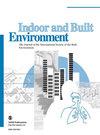Responses of air-conditioning loads to climate change and its impact on carbon emissions in the hot summer and warm winter climate
IF 2.9
3区 工程技术
Q2 CONSTRUCTION & BUILDING TECHNOLOGY
引用次数: 0
Abstract
Energy consumption of air-conditioning in wet and hot climates is not only for cooling but, to a large extent, for dehumidification. Taking urban agglomeration in the Pearl River Delta region as a case study, this study analysed the cooling and dehumidification loads during the past 20 years. In addition, the impacts of cooling and dehumidification loads on carbon emissions were determined. The results showed that there was large spatial heterogeneity in the variations of the cooling and dehumidification loads. The cooling design loads in 1991–2020 was increased 1.83% to 5.56% compared to those in 1971–2000, while the loads for dehumidification was decreased 0.92% to 5.5%. Carbon emissions from cooling were increased, exceeding the carbon reduction from dehumidification, which leads to a weak increase in total carbon emissions. This study revealed that air-conditioning design should fully consider climate change impact by separating cooling and dehumidification loads, increasing the cooling load to avoid insufficient air-conditioning output but reducing the dehumidification load to promote energy efficiency of the air-conditioning system and to reduce carbon emissions. More importantly, an assessment of design loads with climate change in city or small scales should be made before determining summer air-conditioning system design capacity.夏热冬暖气候下空调负荷对气候变化的响应及其对碳排放的影响
在潮湿和炎热的气候条件下,空调的能源消耗不仅用于制冷,而且在很大程度上还用于除湿。本研究以珠江三角洲地区的城市群为例,分析了过去 20 年的制冷和除湿负荷。此外,还确定了降温和除湿负荷对碳排放的影响。结果表明,降温和除湿负荷的变化存在较大的空间异质性。与 1971-2000 年相比,1991-2020 年的制冷设计负荷增加了 1.83% 至 5.56%,而除湿负荷则减少了 0.92% 至 5.5%。制冷的碳排放量增加,超过了除湿的碳减排量,导致碳排放总量微弱增加。这项研究表明,空调设计应充分考虑气候变化的影响,将制冷负荷和除湿负荷分开,增加制冷负荷以避免空调输出不足,但减少除湿负荷以提高空调系统的能效和减少碳排放。更重要的是,在确定夏季空调系统的设计容量前,应评估城市或小范围内气候变化的设计负荷。
本文章由计算机程序翻译,如有差异,请以英文原文为准。
求助全文
约1分钟内获得全文
求助全文
来源期刊

Indoor and Built Environment
环境科学-工程:环境
CiteScore
6.40
自引率
25.00%
发文量
130
审稿时长
2.6 months
期刊介绍:
Indoor and Built Environment publishes reports on any topic pertaining to the quality of the indoor and built environment, and how these might effect the health, performance, efficiency and comfort of persons living or working there. Topics range from urban infrastructure, design of buildings, and materials used to laboratory studies including building airflow simulations and health effects. This journal is a member of the Committee on Publication Ethics (COPE).
 求助内容:
求助内容: 应助结果提醒方式:
应助结果提醒方式:


